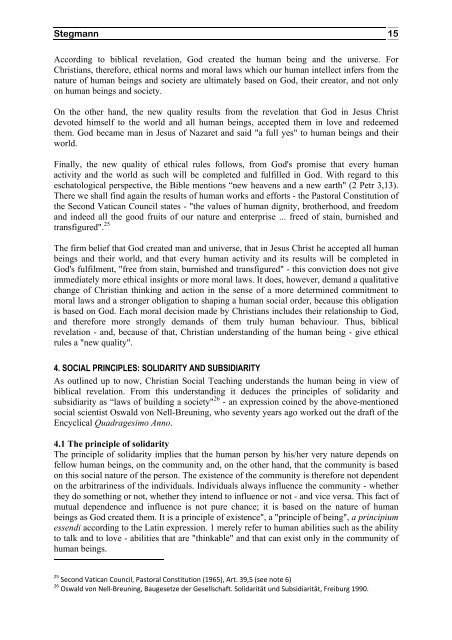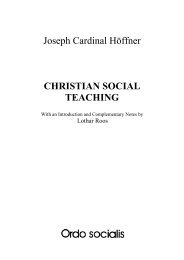Prof. Franz Josef Stegmann Bethlehem Social ... - Ordo Socialis
Prof. Franz Josef Stegmann Bethlehem Social ... - Ordo Socialis
Prof. Franz Josef Stegmann Bethlehem Social ... - Ordo Socialis
Create successful ePaper yourself
Turn your PDF publications into a flip-book with our unique Google optimized e-Paper software.
<strong>Stegmann</strong><br />
According to biblical revelation, God created the human being and the universe. For<br />
Christians, therefore, ethical norms and moral laws which our human intellect infers from the<br />
nature of human beings and society are ultimately based on God, their creator, and not only<br />
on human beings and society.<br />
On the other hand, the new quality results from the revelation that God in Jesus Christ<br />
devoted himself to the world and all human beings, accepted them in love and redeemed<br />
them. God became man in Jesus of Nazaret and said "a full yes" to human beings and their<br />
world.<br />
Finally, the new quality of ethical rules follows, from God's promise that every human<br />
activity and the world as such will be completed and fulfilled in God. With regard to this<br />
eschatological perspective, the Bible mentions “new heavens and a new earth" (2 Petr 3,13).<br />
There we shall find again the results of human works and efforts - the Pastoral Constitution of<br />
the Second Vatican Council states - "the values of human dignity, brotherhood, and freedom<br />
and indeed all the good fruits of our nature and enterprise ... freed of stain, burnished and<br />
transfigured". 25<br />
The firm belief that God created man and universe, that in Jesus Christ he accepted all human<br />
beings and their world, and that every human activity and its results will be completed in<br />
God's fulfilment, "free from stain, burnished and transfigured" - this conviction does not give<br />
immediately more ethical insights or more moral laws. It does, however, demand a qualitative<br />
change of Christian thinking and action in the sense of a more determined commitment to<br />
moral laws and a stronger obligation to shaping a human social order, because this obligation<br />
is based on God. Each moral decision made by Christians includes their relationship to God,<br />
and therefore more strongly demands of them truly human behaviour. Thus, biblical<br />
revelation - and, because of that, Christian understanding of the human being - give ethical<br />
rules a "new quality".<br />
4. SOCIAL PRINCIPLES: SOLIDARITY AND SUBSIDIARITY<br />
As outlined up to now, Christian <strong>Social</strong> Teaching understands the human being in view of<br />
biblical revelation. From this understanding it deduces the principles of solidarity and<br />
subsidiarity as “laws of building a society" 26 - an expression coined by the above-mentioned<br />
social scientist Oswald von Nell-Breuning, who seventy years ago worked out the draft of the<br />
Encyclical Quadragesimo Anno.<br />
4.1 The principle of solidarity<br />
The principle of solidarity implies that the human person by his/her very nature depends on<br />
fellow human beings, on the community and, on the other hand, that the community is based<br />
on this social nature of the person. The existence of the community is therefore not dependent<br />
on the arbitrariness of the individuals. Individuals always influence the community - whether<br />
they do something or not, whether they intend to influence or not - and vice versa. This fact of<br />
mutual dependence and influence is not pure chance; it is based on the nature of human<br />
beings as God created them. It is a principle of existence", a "principle of being", a principium<br />
essendi according to the Latin expression. 1 merely refer to human abilities such as the ability<br />
to talk and to love - abilities that are "thinkable" and that can exist only in the community of<br />
human beings.<br />
25 Second Vatican Council, Pastoral Constitution (1965), Art. 39,5 (see note 6)<br />
26 Oswald von Nell‐Breuning, Baugesetze der Gesellschaft. Solidarität und Subsidiarität, Freiburg 1990.<br />
15















